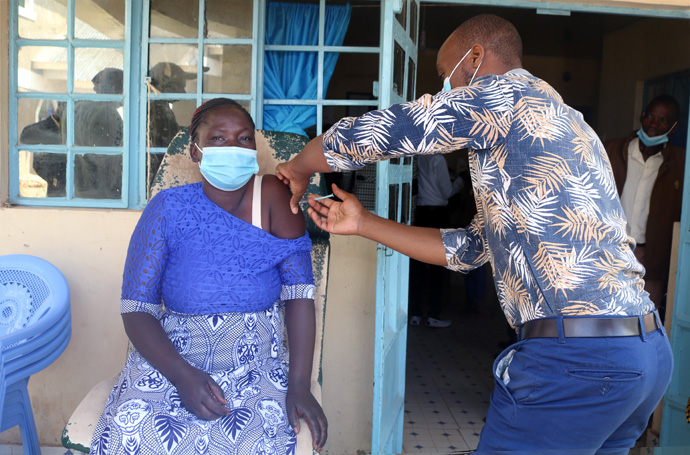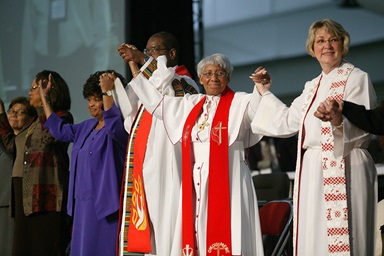Key Points:
- Joint effort by Christian, Hindu and Muslim faith groups results in more than 1,000 people receiving vaccination since December 2021.
- Three times in the past two months, local health vaccine providers used St. John’s United Methodist Church, Kayole, and First United Methodist, Moheto, as vaccine stations.
- The Rev. Kennedy Mwita, senior pastor at First, Moheto, says vaccination of church members has made it possible to conduct in-person church services.
- “It has been an avenue of evangelism and much more of a kind gesture to the community,” says the Rev. Patrick Wandera, St. John’s, Kayole.
Challenged by reluctance to accept the COVID-19 vaccine, United Methodist churches in Kenya launched a campaign to dismantle stigma and distrust.
Steadfastly supporting the government’s efforts to vaccinate against COVID-19, religious leaders introduced a three-month awareness effort, opening their houses of worship as vaccination sites.
Through the Inter-Religious Council of Kenya, leaders from Christian, Hindu and Muslim faith communities signed a declaration committing to promote vaccinations.
Since December 2021, more than 1,000 people have received the vaccine at church sites.
Millions of older adults and low-income people, at risk of catching the virus, lack cars or ready access to public transportation. Some are housebound. Others reside in rural locations, far from immunization centers. More worrisome is the absence of a reliable way to disseminate vaccination messages and receive feedback from scattered households lying deep in the villages.
As churches considered how their spaces and resources might assist the vaccination endeavor, United Methodists in Kenya remained receptive and committed to the cause. However, the unprecedented financial crisis in the aftermath of the pandemic challenged implementation of holistic approaches that care for women, youth and older adults.

In response to the challenge, the Wema Health Foundation partnered with local churches to embrace a holistic approach that would ensure delivery of vaccines to those who have difficulties getting them, thus reducing the disparities in health service provision, particularly in rural areas and densely populated slums in Kenya.
Three times in the past two months, local health vaccine providers used St. John’s United Methodist Church, Kayole, and First United Methodist, Moheto, as vaccine stations.
Leah Nanyanga, a United Methodist deaconess and Wema Health Foundation founder, led a team from the United States to First, Moheto, in December 2021 to kick off a 10-day medical mission journey in partnership with the ministry of health in the Kuria west subcounty. More than 500 people were vaccinated against COVID-19. In addition, 200 patients were treated for female circumcision complications, and three girls were rescued from having the procedure.
While the local health vaccine providers administered vaccinations, the team distributes premade period-pad kits to the local schoolgirls through a program of First, Moheto. The girls learned about reproductive health and safety.
Patients were also treated at Moheto UMC Medical Center and Emalia Community Health Center. Elizabeth Makous, coordinator of the large pelvic health and lymphedema programs at Henry Mayo Hospital Fitness Center in California, donated a headlamp and a desktop computer to the medical center. The lamp provides alternative lighting in case of a power outage, and the computer enhances patient recordkeeping and online research and analysis.
In addition, Makous donated anatomy posters, material to make reusable sanitary pads, vitamins, over-the-counter medicines, wound-care supplies, and lower-leg compression wraps and garments.
She noted that the visit was important in determining the consequences of female genital mutilation and the role of physical therapy in treating it.
“We know our ministry’s time, resources and education will slowly better the lives of women,” she said. “All the men helping us at the church and hospitals were Kenyans who have broken this cycle and whose values reflect respect for women and girls, having one wife and taking mutual responsibility for their fertility. Over the long week, I treated many patients as I trained and learned from my new colleagues.”
Noting the poor sanitation conditions, Makous added, “This is what Kenyans’ immune systems are used to and the very reason one of the patients walked and farmed on an open oozing foot wound for eight years without dying of an infection.
“We treated problems ranging from pelvic pain, incontinence, bladder pain, testicular hydroceles, hernias, skin diseases, ankle sprains, fractures, polio, edema and wounds,” she said.
Subscribe to our
e-newsletter
The Rev. Kennedy Mwita, senior pastor at First, Moheto, said vaccination of church members has made it possible to conduct in-person church services.
“During the second phase,” he explained, “we embarked on a house-to-house vaccination plan after realizing that many people could not travel long distances. No one is safe until we are all safe. I thank all those who made this exercise possible in the Moheto community.”
St. John’s, Kayole, in partnership with Wema Health Foundation, gathered stakeholders — including local authorities and health officers, mobilizers, volunteers and transporters — to conduct a vaccination program that saw over 600 people vaccinated against COVID-19.
The Rev. Patrick Wandera, senior pastor, said the vaccination effort helped the church to vaccinate up to 95% of the adult population.
“Many people thanked us for providing the vaccination program,” he said. “The Congolese refugee families felt welcome and cared for, as well as our other members. It has been an avenue of evangelism and much more of a kind gesture to the community.”
In 2020, Nanyanga, a Master of Divinity student, arrived at Drew University in New Jersey. She vividly recalled lessons learned from COVID-19. She cited the pandemics of racial and ethnic discrimination threatening public health, ecological crises threatening the well-being of millions of people across the world, and the spiritual and cultural crises of distrust of power and authority as pertinent issues.
“Some of my responses to the COVID-19 pandemic,” she said, “were sewing approximately 1,000 masks for those in need on campus and communities in the U.S.”
She also assisted fellow international students to book appointments and get their COVID-19 vaccinations doses, and sewed 10,000 masks that were donated to the church and individual organizations in Kenya that distributed clean water and soap.
In 2020, a partnership was made with Central United Methodist Church in Asheville, North Carolina, through the friendship between the Reconciling Ministries Network and First, Moheto. It led to the funding of laboratory equipment for the Moheto medical clinic to enhance quality diagnosis and treatment of patients in the community.
“Ensuring a holistic health life is a divine obligation God has given unto us,” Nanyanga said.
“I challenge us to think of the understanding of conventional and nonconventional health, with focus on physical health, mental health, spiritual health, environmental health and ritual health,” she said, “as well as analysis of health care systems and processes that respond to individual and communal disease and dis-ease.
“I am grateful to United Methodist Women, Central UMC (Reconciling Ministries Network), friends like Elizabeth Makous, and the local churches that accompany us in this ministry.”
Maiga is a communicator for the Kenya-Ethiopia Conference.
News media contact: Julie Dwyer at newsdesk@umnews.org. To read more United Methodist news, subscribe to the free Daily and Friday Digest.




